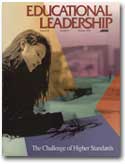I am haunted by a conversation I had with Darlene (a pseudonym) during an accreditation visit in 1991. Near the end of a team meeting, a teacher came to me and said, “Professor, there's a student at the door who will not leave until she speaks to you. She's just a special education student,” the teacher continued, “and I don't think she has any business seeing you. But she won't leave.”
At the door was one of the seniors the team had interviewed yesterday. The morning was cool, so Darlene and I found a warm room and talked for almost an hour. She was hurt and confused. As the first person in her family ever to attend school for 12 years, she expected to earn a regular diploma. Twice, however, Darlene had failed the State of Alabama's high school exit exam and thus was eligible only for a certificate of attendance.
A Personal Tragedy
“Is it fair for them to keep my diploma?” she asked, fighting back tears. She talked about kids who fought and sassed the teachers, who cut class and took dope, who acted up and interfered with instruction, lazy kids who refused to do homework. After each example she would say, “I didn't do that; I did what they told me to do.” Three times during our conversation she sobbed, “I know I'm in special education and we're slow. But I tried hard and did my work. I didn't cause trouble.”
She thought that we, the visiting committee, could make “them” give her a diploma because “they” were being unfair. In the end, I had to tell her that neither I nor the committee could do anything to get a diploma for her, since the new procedure for awarding diplomas was initiated after she entered high school. I did say, half-heartedly, that I would do what I could to get the rule changed.
I returned to the district a few months later to explore the situation. First, I had to find Darlene to get permission to see her school records. She was living in a mobile home park, a rural ghetto, with her single welfare mother and several siblings. Their dilapidated trailer would have been condemned if the county had zoning laws.
Darlene was not as bitter or hurt as when we talked earlier. She seemed more worried about getting a job, since she lived in the country and had no transportation. Because she had completed the vocational child-care program in high school, I suggested a day-care job. Darlene had applied to every local child care center, she told me, but to no avail. Without a diploma, Darlene's chances of finding work were very poor.
The Academic Question
Beyond the tragedy of Darlene's plight looms an academic question: Does Darlene deserve a high school diploma? She can barely read, and she speaks with a slight lisp. Although she started school at age 7 and repeated 1st grade, she made good grades in every subject, except social studies, throughout elementary and middle school. Her high school grades were low average. The high school counselor supports Darlene: “She tried so hard and worked so hard; she came early and she stayed late on test days.” Near the end of the conversation, the counselor talked about Darlene's strengths: She knew how to get along with people. Her clothes were always clean and ironed, and that's impressive, especially for a student as poor as Darlene. The kindergarten teachers who supervised her in the child-care program loved her. She would have a diploma and a job if it weren't for that stupid test.
The counselor reminded her colleagues of a similar student who now holds a responsible position with a national firm: Like Darlene, Suzanne, too, could barely read, but she worked hard and she got along. She got the opportunity to work there because she had a diploma. Suzanne probably couldn't read above the 4th grade level, but she has kept the job because of other traits: being responsible, courteous, dependable, and hard working.
Darlene's supervising teachers praised her work habits and personal character, but had reservations about her reading ability: Darlene was best when she worked with kids. She enjoyed reading to the kids if she could select the book. Unfortunately, she felt comfortable only with certain books.
The Spectrum of Human Abilities
I believe schools should have high standards, yet I also believe in fairness. A student who invests 12 years working hard, studying, and obeying teachers—who has been reinforced by teacher praise and acceptable grades—deserves a diploma even though the diploma's value—as we have traditionally defined it—may be suspect. In some states, the value of a 12-year investment in school can be reduced to near zero by one score on one multiple-choice test.
Our nation has come full circle. More than 100 years ago, when no standards existed to gauge the quality of students applying for college admission, committees of scholars and educational leaders studied the problem. Eventually, the Carnegie Unit evolved as the standard reporting unit. In the latter part of this century, we turned increasingly to standardized tests because, once again, we recognized that not all diplomas were alike.
It's time to take a new look at how we measure and report student ability. We must devise a system that recognizes other abilities and character traits, in addition to academic skills. Darlene has many qualities that employers value. Although weak in reading, she may well be strong in some of the “multiple intelligences” that Howard Gardner describes (1983). Standardized tests can't assess and A-B-C grades can't report most of these qualities, but Elliot Eisner suggests methods for achieving these goals (1985).
If schools do anything, they must insist on fair treatment of all students—by assessing and reporting the entire range of human abilities. We cannot continue to limit the opportunities of capable people like Darlene, who have much to offer but little chance to realize their potential.
